Miraculous Community Amidst an Incomprehensible Magnitude of Devastation
A first-hand account of the wide-spread devastation left by Hurricane Helene
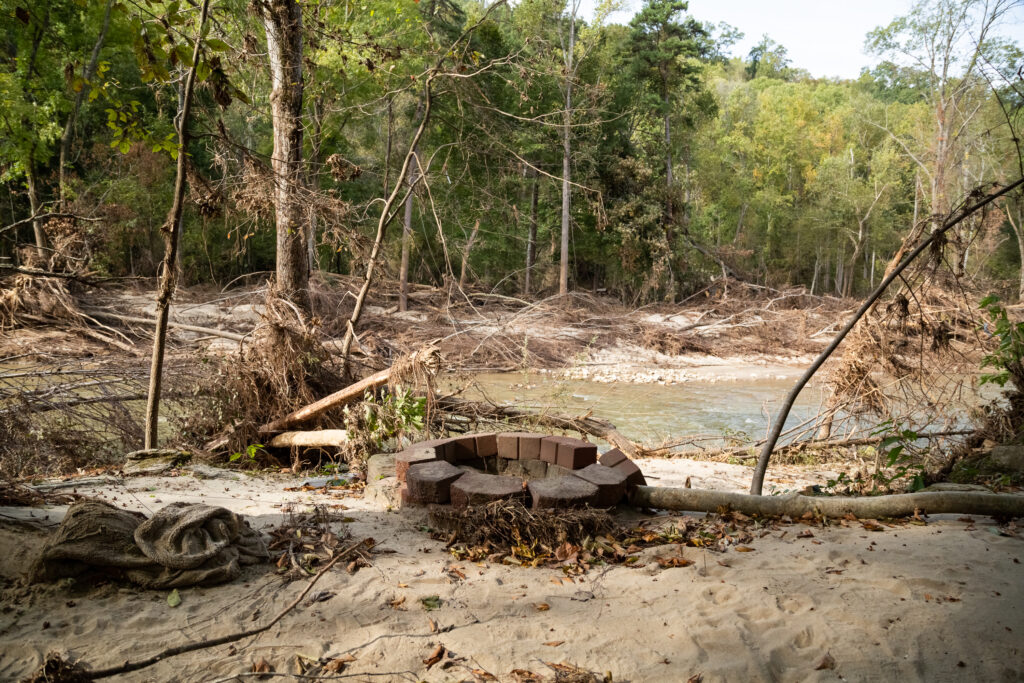
This is a guest blog by Rachel Kelleher.
On September 27, 2024, our lives, as we knew them, were forever changed. Hurricane Helene decimated Western North Carolina, a place I call home. The mountains and rivers in this region have brought me peace and healing while supporting my growth and encouraging my strength to blossom. The landscapes here have shaped me. We are collectively grieving the loss of lives, homes, businesses, and the sanctuary of our rivers as we once knew them, so intimately. When I close my eyes, I can run the Green River Narrows in my mind. Every move, like a dance to the sweet song of homecoming. Forever changed, the Green flows naturally, each move a new sequence to explore, discover, and unlock. There are new landscapes to traverse — a mystery to unfurl.
When the rivers swelled to historic peaks, I was directing a mountain bike festival in Fayetteville, Arkansas. I was enveloped by a feeling of helplessness not being there to help physically. Hurricanehelenewnc.com was born on the side of the highway on my way back home. This webpage was built to support my friends in the Whitewater community who had mobilized a direct action response team in Asheville to help communities and individuals in need. We have developed into Helene Rebuild Collaborative. We allocate resources directly to communities that are underserved, isolated, and cut off. We coordinate a variety of specialized volunteer operations that serve to fill in the gaps of aid provided to our rural communities.
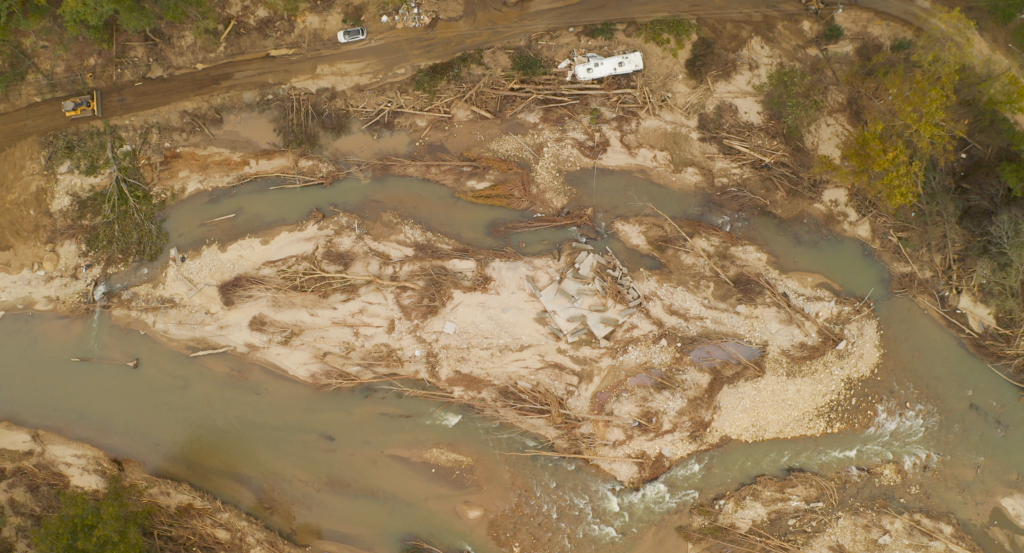
Rainpursuit.org reported 32 inches of rainfall in 72 hours near my home at the Green River Cove in Polk County, Saluda, NC. The sheer volume of water that inundated the landscape was not only incomprehensible but landed with such a devastating force that it forever altered the region and the people who survived. The communication grid broke down and people found themselves disconnected from the outside world. Cell phones didn’t work and no one had power. Flooded rivers and devastated infrastructure isolated communities creating fragmented pockets of people scattered throughout the region, completely cut off. In these isolated communities, basic needs were met by humans coming together to support and share resources – neighbors helping neighbors. The initial response was geared towards primal life-saving efforts, then moved towards basic survival needs of water, food, and shelter.
Energetically toggling between mayhem and mass destruction, chaos and catastrophe, devastation and gratitude. I haven’t even begun to unpack the cacophony of emotions brought on by this disaster and I believe we will need new vocabulary words to encapsulate these feelings. The scene here is post-apocalyptic. Wide-spread wreckage, major sand deposits, destruction, and trash piles scattered everywhere. You are left to confront the dualities of our human experience at every intersection, while your nervous system is stretched to an unfathomable capacity. I imagine that we have evolved to a higher capacity of functioning under high loads of stress because of the direct, focused response required by the magnitude of this historic event.
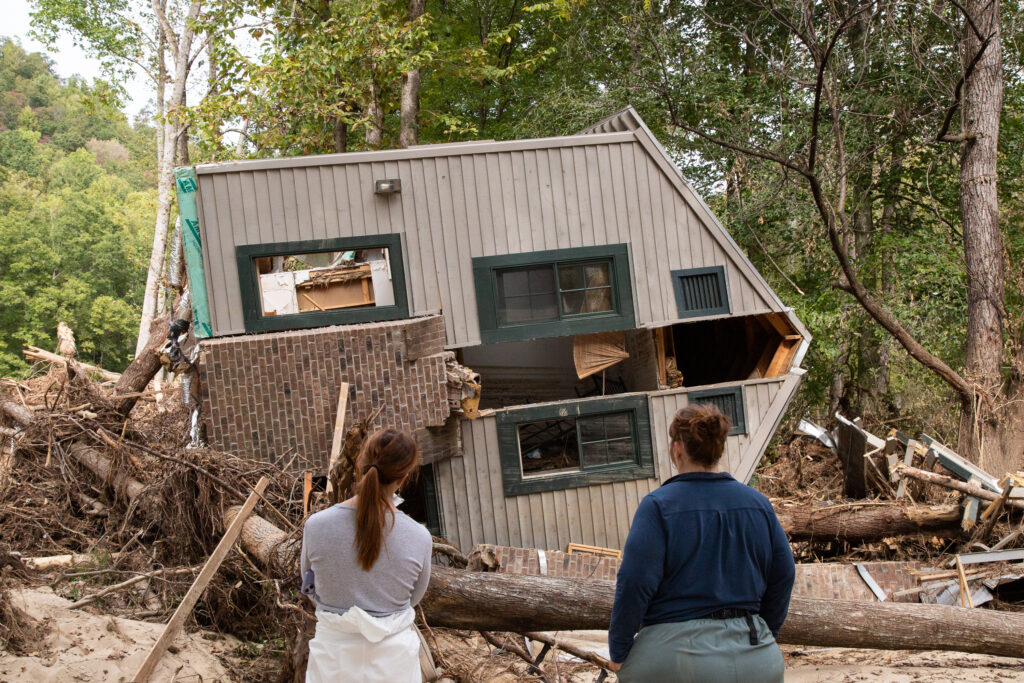
Living through a disaster chimes you into experiencing more gratitude for the simple things we’ve grown accustomed to taking for granted. Having a safe, warm place to rest your head at night, access to clean water, access to food, and connection to emergency medical services. We’ve been challenged both as individuals and communities by this disaster to rise to the occasion to help and support each other. I now understand directly what it means to be displaced and unable to meet your basic needs. To ask for help from this place of need requires a tremendous amount of vulnerability and courage and is one of the most difficult places I’ve ever found myself in. I’ve seen people soften with compassion as a result of empathetic understanding of these new found hardships. At this time, everyone is reaching out a hand and it’s a beautiful miracle to witness and be a recipient of such kindness. There’s a grand illusion of sorts that serves to divide us and entangle us in fear while our natural pulse is towards connection and community with each other. We have to remember that we can accomplish anything when we work together, set aside our differences, and help support one another in times of need. It’s really quite simple.
The force of the Appalachian people is as strong as the mountains in this region. The landscape is vast, steep, hard, and weathered. Water is abundant here and flows like arteries and veins directly into the heart of Appalachia. We stand together in our strengths, united by this life force, and nothing can bring us down. Our collective pulse is vigorous like the creeks and rivers flowing that provide life to our communities and biota. Each individual, when brought together in community, forms the powerful and steady heartbeat of Appalachia. We will sustain connection with each other while rebuilding and maintain unity throughout these lands as a direct reflection of our American dream. Sometimes, it’s only through a path of destruction and deep turmoil that can shepherd us towards an opportunity to cultivate ripe ground. To forge a new dawn and restore humanity back into deep connection and community.
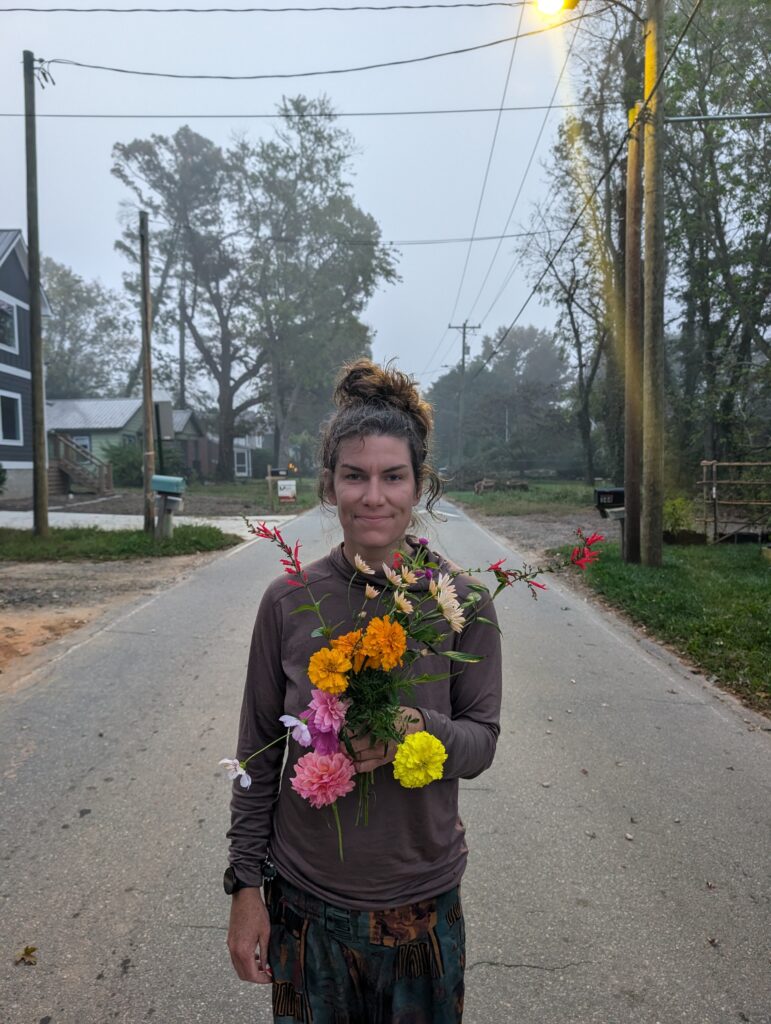
Rachel lives in Western North Carolina and is an avid mountain biker, whitewater kayaker, and nature lover.
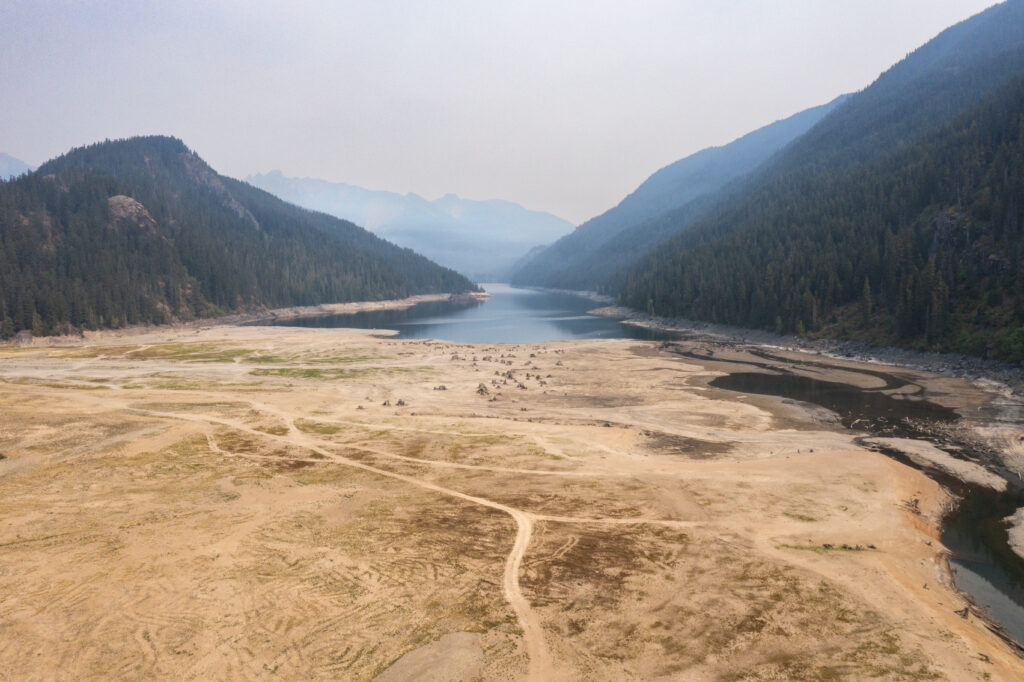
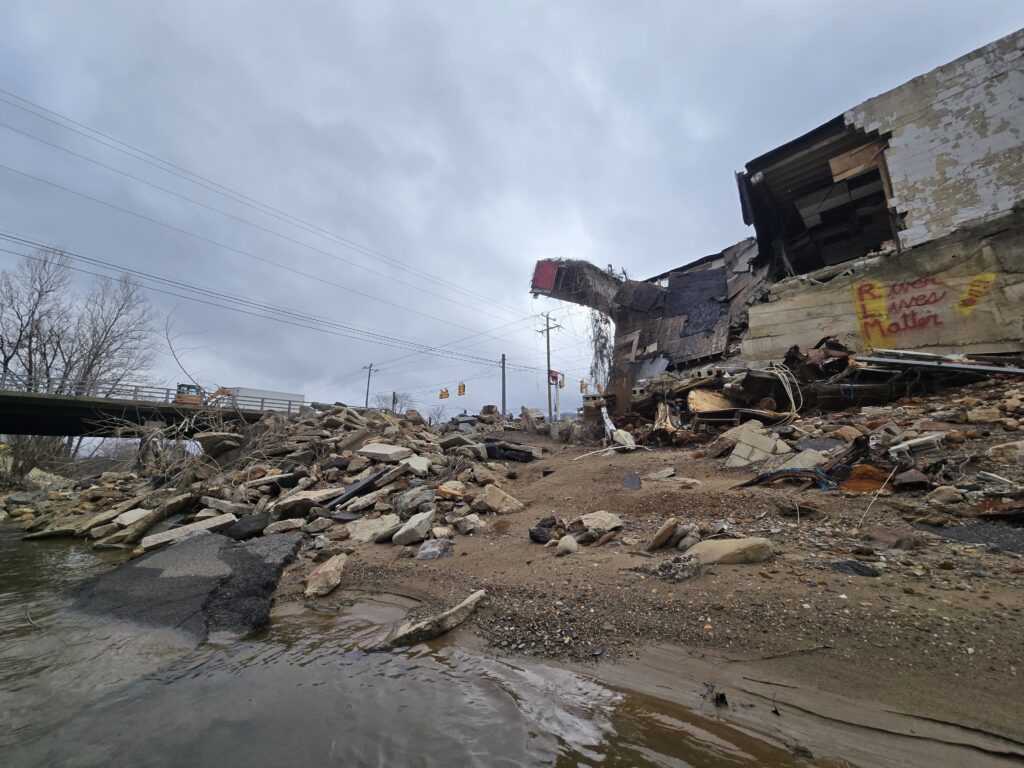
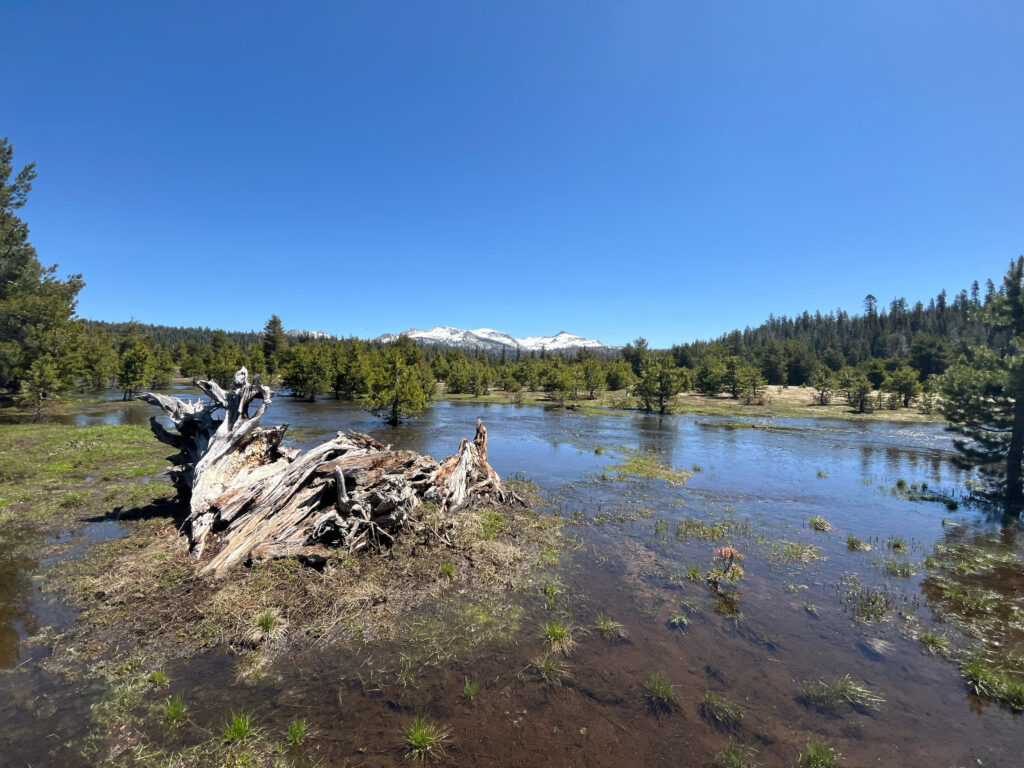
3 responses to “Miraculous Community Amidst an Incomprehensible Magnitude of Devastation”
Beautifully written thoughts. Thank you for sharing your article.
What a wonderful article you have written, bringing readers to the stark reality that you have been facing. I am awed by the photos and your writing – wishing you the very best as you go forward. I am deeply grateful for your writing – and for YOU.
Thank you, Rachel,
You describe the way forward not only for your community but for us all.